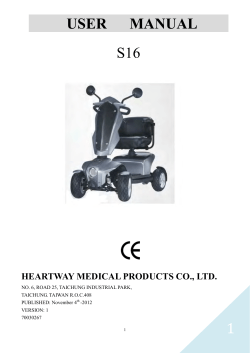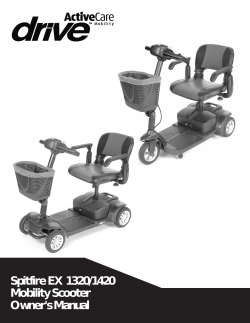
1.1 The Association recognises that a number of customers may... mobility scooter which allows them additional mobility and maximises independent POLICY
POLICY Mobility Scooters 1. Overview 1.1 The Association recognises that a number of customers may wish to own or lease a mobility scooter which allows them additional mobility and maximises independent living. Due to an increasingly ageing population there will be an inevitable increase in the ownership, leasing and usage of mobility scooters amongst customers. 1.2 The Association has a duty of care to all customers in sheltered and extracare accommodation, both those who use scooters and those who do not. This duty of care is discharged via the organisation which currently manage the schemes, Care Plus. It is important that scooter users understand what is required of them while living and using facilities in schemes and take full responsibility for the use of their mobility scooters. Customers are expected to be aware of and comply with all requirements placed upon them relating to the storage and use of their mobility scooters. 1.3 This policy sets out the Association’s position on the ownership, use, charging and storage of mobility scooters in sheltered and extracare schemes. The principles of the policy apply to scooter users in general needs accommodation but these are guidance only as these properties are not communal living. Any issues with scooters in extracare, sheltered or general needs accommodation with be dealt with via the Anti Social Behaviour Policy and Tenancy Conditions. 2. Background and Definitions 2.1 Powered scooters are defined as “invalid carriages” under the Use of Invalid Carriages on Highways Regulations 1988. The regulations divide these machines into three classes. Class 1 These are manual wheelchairs (not covered by this policy). Class 2 These are machines designed for use on the pavement, travelling at speed of up to 4mph. They may also be used on the road to cross from one pavement to the other or where there is no pavement available. Class 3 These are machines that can be used both on the pavement, where they are limited to 4mph, and on the road where they can travel at speeds of up to 8mph. These vehicles are required by law to be registered with the DVLA for road use. These vehicles will be licensed in the disabled taxation class and must display a nil duty tax disc. Class 3 vehicles can only be used by a disabled person aged 14 or over. Mobility Scooters Policy Page: 1 of 5 3. Purchase 3.1 Prior to purchasing or leasing a scooter customers should consider how they are going to safely store and charge it. They should make themselves aware of the conditions set out in this policy and how they will operate the scooter within a sheltered or extracare scheme. They also need to consider any limitations to scooter use in the scheme or their property (for example, door and corridor widths). 3.2 Scooters should be safe and in a fit condition to use. New purchases or leases should have a manufacturer’s guarantee and second hand purchases should be in good repair and have a full service history. 3.2 Scooter purchasers or leasers should make themselves aware of any servicing requirements for their vehicle and comply with these. 4. Training and Usage 4.1 It is advised that all scooter users undergo adequate training on the usage and control of the scooter they are purchasing or leasing. The company selling the scooter should be able to provide the training. 4.2 If the scooter is purchased second hand the customer should ensure that they receive adequate training on the usage and control of the vehicle before use and that it is appropriate for their needs. 4.3 Scooter users must drive safely and with full consideration for other users of the scheme. 4.4 Class 3 mobility vehicles should not be stored or driven inside Association extracare or sheltered schemes due to the high speeds and higher risk to residents, visitors and property. These vehicles should be stored in a clearly dedicated external safe area identified so as not to obstruct escape routes or have trailing cables through inappropriate routes such as fire exits. 5. Insurance 5.1 All mobility scooters used in sheltered and extracare schemes must have suitable insurance in place. This must include liability insurance in case of either damage to buildings and grounds, or injury involving staff and other people who may be living in or visiting the scheme. It should also cover damage to the scooter and the user. 5.2 Any damage to Association or Care Plus property caused by a mobility scooter will be recovered through the scooter owner’s insurance company. If the owner does not have a current insurance certificate, they will be personally liable for all costs, and asked to Mobility Scooters Policy Page: 2 of 5 remove the scooter from the scheme immediately until such time as suitable insurance is in place. 5.3 A copy of a current insurance certificate must be given to the Supported Living Coordinator or Care and Support Manager and subsequently each year a renewal certificate must be supplied. The Supported Living Coordinator or Care and Support Manager will be responsible for managing, monitoring and reviewing these insurance documents. 5.4 Scooters which are not insured must not be used in sheltered and extracare schemes. 6. Storage and Charging 6.1 Storage and charging facilities for scooters outside the premises are available at some sheltered and extracare schemes however space in these may be limited. 6.2 Customers who have or are thinking of acquiring a mobility scooter must ensure that the scheme they wish to live in has room available for the storage and charging of scooters before they accept a tenancy. 6.3 Allocation of storage space for a mobility scooter will take place on a first come, first served basis. If there are already mobility scooters parked at a sheltered or extracare schemes scheme, the Supported Living Coordinator/Care and Support Manager will record details and ensure that there is adequate space for all scooters to remain. If there is not sufficient space, the Supported Housing Coordinator/Care and Support Manager will work with the residents to attempt to achieve a mutually acceptable solution. 6.4 The Supported Living Coordinator/Care and Support Manager will manage and allocate the existing spaces on requests made. Discretion will be used if a request is made on medical grounds with an Occupational Therapist recommendation. It will be the responsibility of the resident to provide sufficient evidence to support their request for a space. 6.5 Mobility scooters must not be stored in the communal corridors or communal areas unless the Supported Living Coordinator/Care and Support Manager has written permission from the Health and Safety Advisor who has given clearance that they are not causing an obstruction to the communal corridors and fire escape routes and that any relevant Fire Authority requirements are met. 6.6 Scooters should be charged within the resident’s property unless specific provision is made within a dedicated charging area. No charging of scooters is permitted in general communal areas including corridors. Charging must be undertaken in accordance with the manufacturer’s instructions and only for the recommended time. Mobility Scooters Policy Page: 3 of 5 6.7 All charging equipment used in a dedicated charging facility will require an annual PAT (portable appliance test) to ensure that it is safe to be use. PAT testing can be arranged by Care Plus annually along with other portable equipment at the scheme. Should the charging equipment fail the PAT it will be the owner’s responsibility to repair or replace the damaged item, and have it retested, before it can be used again. 6.8 Scooters or batteries must not be left on permanent charge. 7. Alterations to Properties 7.1 Where customers are prepared to fund alterations for the storage and charging of mobility scooters themselves they must seek landlord’s permission prior to the work commencing. 7.2 We will not unreasonably withhold permission for a resident/s to place a small scooter shed/building at the rear of a scheme or where it is practicable to do so but only after consultation with neighbours and other residents and an assessment on any impact with regards to safety and fire safety. Where required, planning permission from the local planning authority will need to be obtained by the resident prior to the shed/building being erected. 7.3 Any redevelopment of redesign of sheltered schemes will take account of the needs of current and future scooter users. Mobility Scooters Policy Page: 4 of 5 Policy Data Risk Assessment Consultation Fire Risk Assessments are undertaken annually for each sheltered and extracare scheme by the Association’s Health and Safety Advisor and the relevant Fire Authority enforcement officers. These identify specific risks and controls are put in place to manage these. A working group of residents who are scooter users were involved in the development of this policy with a follow up survey of users and non users to identify any specific impacts This policy impacts particularly on older people and those with disabilities. No specific issues for data protection. Issues for Equality and Diversity Issues for Data Protection Act Associated Policies and Anti Social Behaviour Policy Choice Based Lettings Policy Procedures Tenancy Policy Associated Documents Support Plan Tenancy Conditions / Leaflets Regulatory Reform (Fire Safety) Order 2005 No directly applicable Standard. National Standard Responsibility Assistant Director Care and Support Director Head of Care and Support Manager Survey of scooter users and non users undertaken in Reporting August/September 2013. June 2012 Policy Creation Date Three years. Review Period Previous Review Dates October 2013 SSHA Board Review Committee 1.1 Version Number October 2013 Date Last Amended October 2013 – clarification of duty of care responsibility and Fire Amendments Authority requirements; update of Policy Data block. October 2016 Next Review Date Mobility Scooters Policy Page: 5 of 5
© Copyright 2025





















